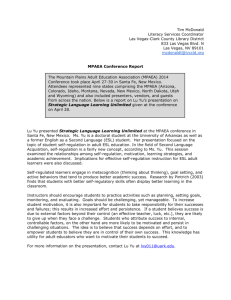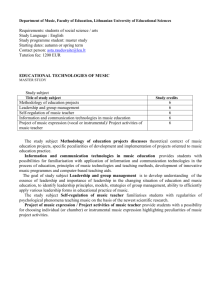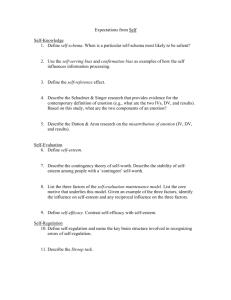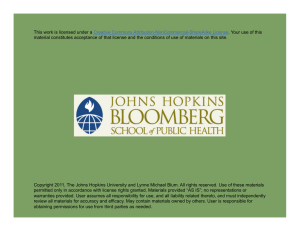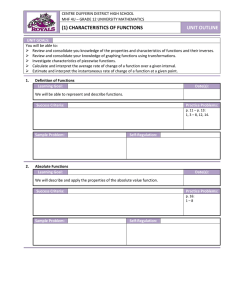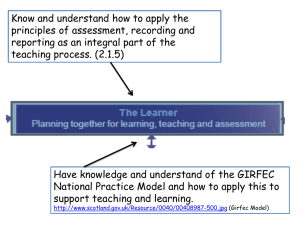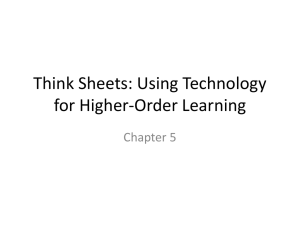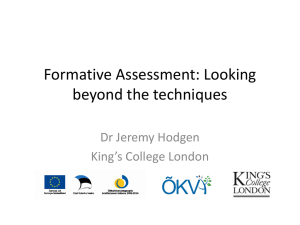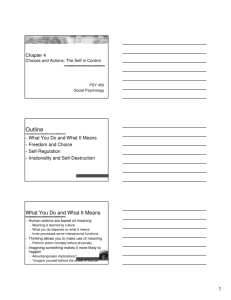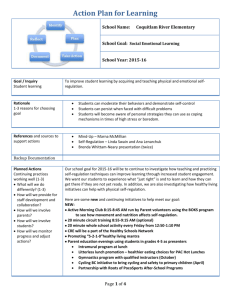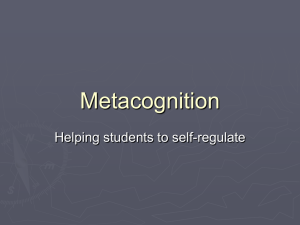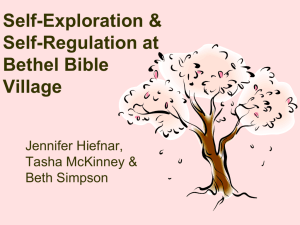active learning
advertisement
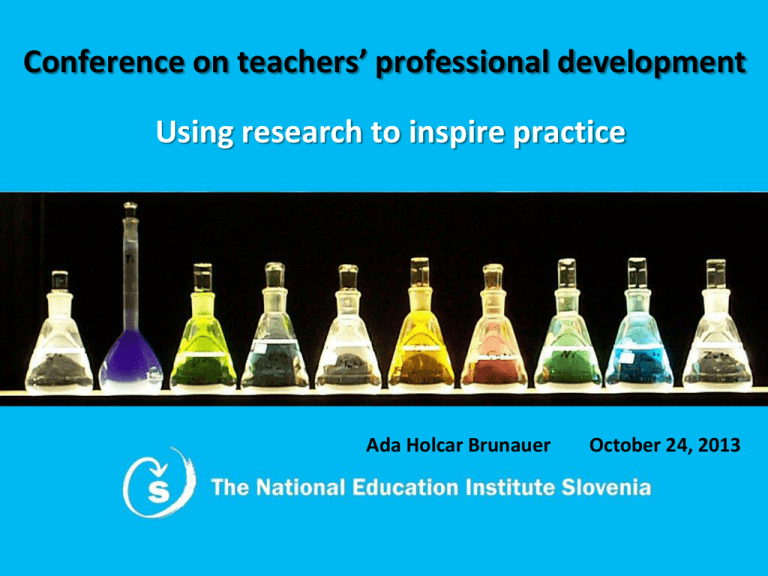
Conference on teachers’ professional development Using research to inspire practice Ada Holcar Brunauer October 24, 2013 ACTION – identifying and exploring an issue, question, dilemma, gap … … to improve the quality of teaching and learning ... AREAS TO INVESTIGATE (Fisher, 2001): - your teaching and making changes in teaching practice, - your learners and how they learn, - your interaction with the current curriculum, - your teaching beliefs and philosophies and their connections with daily practice. ACTION RESEARCH STUDY Think about what we want to focus on Reflect Reflect on what has happened to improve further Plan Plan what to do Observe Observe, monitor and record Act Carry out plan, collect evidence Using research to inspire practice ACTION RESEARCH STUDY – Assessment for Learning Using research to inspire practice 1st FOCUS GROUP MEANINGFUL LEARNING Connection to real life Project work (»deep learning«) Having a possibility to chose within the unit Active learning No time pressure Co-operative learning (group work) MEANINGFUL ASSESSMENT Comments instead of grades Grades in the middle/end of the school year 5 KEY STRATEGIES – FORMATIVE ASSESSMENT (Wiliam, 2010). 1) Clarifying, sharing and understanding learning intentions and criteria for success. 2) Engineering classroom activities that elicit evidence of learning. 3) Providing feedback that moves learners forward. 4) Activating students as instructional resources for one another. 5) Activating students as owners of their own learning. … to improve the quality of teaching and learning ... 1. Clarifying, sharing and understanding learning intentions DEEP LEARNING HAVING A POSSIBILITY TO CHOSE WITHIN THE UNIT Understanding learning intentions INVESTIGATE: explore, use senses, generate ideas and possibilities • • • • • What are the aims and objectives, expectations of the task? What is the knowledge and understanding required? Where will you find the information? What skills are involved? How will you work: alone, with a partner or in a group? COOPERATIVE LEARNING Understanding learning intentions PLAN: list of tasks, timescale, assignments of jobs • • • • How long do you have? What is already known? What needs to be done and when? Which other curriculum areas are involved? HAVING A POSSIBILITY TO CHOOSE Clarifying, sharing and understanding criteria for success CONNECTION TO REAL LIFE 2. Engineering classroom activities that elicit evidence of learning EVIDENCE OF LEARNING: - Process of creating music Planning Reflection Feedback Response to feedback Evidence of learning ACTIVE LEARNING Evidence of learning CONNECTION TO REAL LIFE 3. Providing feedback that moves learners forward COMMENTS INSTEAD OF GRADES Providing feedback that moves learners forward DEVELOPMENTAL WORKBOOK – example COMMENTS INSTEAD OF GRADES 4. Activating students as instructional resources for one another 21st Century Classroom Has anything really changed? Preparing activities, tasks and assignments for each other, peer assessment, portfolio conferences. Using research to inspire practice 2nd FOCUS GROUP MEANINGFUL LEARNING: Creating music Learning can be fun Having a possibility to evaluate each other‘s work AREAS TO IMPROVE: Self-regulation 5. Activating students as owners of their own learning (How) can I take responsibility for my learning? SELF-REGULATION OF LEARNING 2. 1. WHAT DO I WANT DO I HAVE CONNECTION TO REAL LIFE SELF-REGULATION OF LEARNING Activating students as owners of their own learning CONNECTION TO REAL LIFE SELF-REGULATION OF LEARNING SELF-REGULATION OF LEARNING ASSESSMENT FOR LEARNING – FINDINGS: • Students associate positive attitude towards assessment mainly with descriptive assessment and peer assessment. • The dynamic nature of contemporary forms of teaching and learning provide time and space to talk to students and give them descriptive feedback. • Self-regulation connects learning objectives to the students' lives. »We will need self-regulation in our lives. We haven‘t learned only certain topics, but also how to control ourselves and how to choose the right direction to go.« (F3, E7) WHAT ARE THE KEY EFFECTS OF ACTION RESEARCH ON THE PROFESSIONAL DEVELOPMENT OF TEACHERS? Teacher research will force the re-evaluation of current theories and will significantly influence what is known about teaching, learning, and schooling (Burns, 2009). Teachers leave a mark on their students, but they seldom leave a mark on their profession (Wolfe, 1989). NEW ROLE FOR TEACHERS (Lee Hsien Loong) REFERENCES Burns, A. (2009). Action Research. In: J. Heigham and R. A. Croker (Ed.), Qualitative Research in Applied Linguistic (pp.112-134). UK: Palgrave Macmillan. Morgan, D. L. (1997). Focus groups as qualitative research. UK: Sage Publications Ltd. Patton, M. Q. (1990). Qualitative evaluation and research methods. Newbury Park, CA: Sage Publications.
